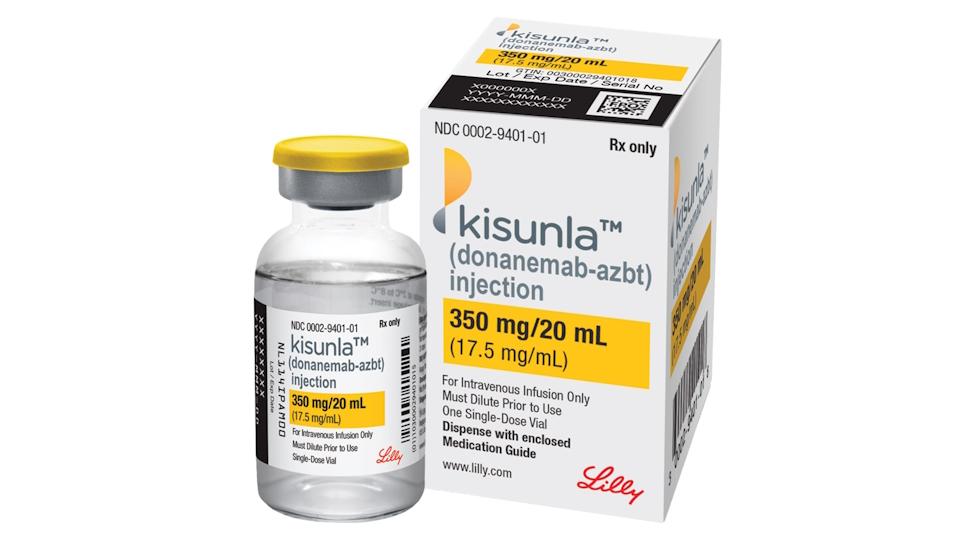Lilly gets FDA OK for Alzheimer’s drug, cites cost advantage

Eli Lilly finally has FDA approval for its amyloid-busting Alzheimer’s disease therapy donanemab and will launch it at a cost it claims could deliver savings compared to a rival therapy from Eisai/Biogen.
The US regulator has cleared donanemab as Kisunla for use in patients with mild cognitive impairment or the mild dementia stage of Alzheimer’s with confirmed amyloid plaques, becoming the third drug in the class after Eisai/Biogen’s short-lived Aduhelm (aducanumab) and current rival Leqembi (lecanemab).
The Alzheimer’s Association hailed the development, saying that having multiple treatments available will raise the onus on health systems to carry out early detection and diagnosis.
Lilly has set a price of $32,000 per year for Kisunla, which is higher than the top-line price of $26,500 for Leqembi. However, according to the company, it could reduce the overall cost of treatment.
That’s because it only needs to be dosed once a month versus every two weeks for Leqembi, requiring fewer visits to infusion clinics, and is approved for use only until amyloid plaques are cleared from the brain. In contrast, Leqembi’s label calls for continuous treatment.
In trials, 61% of patients taking Kisunla saw their plaques resolve within six months, rising to 80% at 12 months and 84% at 18 months. A six-month course would cost $12,522 while the drug would cost $48,696 for patients who need to stay on it for 18 months.
There’s no definite cut-off point for treatment, although, the label says clinicians should “consider stopping” if plaque levels are minimal on PET imaging.
Lilly maintains that the potential to stop early could result in lower patient out-of-pocket costs, as well as fewer infusions, noting that coverage and reimbursement for Kisunla, as well as the required PET scans, are already covered under Medicare.
There’s not much to separate the drugs on efficacy, as both were shown to slow the progression of cognitive decline in Alzheimer’s patients by around a third over 12 months in phase 3 clinical trials.
Some analysts have suggested that Lilly’s drug may have a greater tendency to cause serious side effects known as ARIA, which are rare for both drugs, but potentially life-threatening. It could also face a strong challenge if Eisai and Biogen get approval for a more convenient once-weekly, subcutaneous injection form of Leqembi, which is currently under FDA review. Approval for a monthly IV dose of Leqembi is also being sought.
The Alzheimer’s Drug Discovery Foundation (ADDF) also welcomed the approval, saying it would “catalyse the next generation of therapies”, which could include drugs against tau protein and other targets that could be used in combination to boost the modest efficacy of amyloid drugs on their own.
There’s little doubt that having two FDA-approved options on the table could help to unlock the market for amyloid-targeting agents. After the debacle of Aduhelm’s rollout - marred by controversy over its efficacy data - Leqembi started slowly, but has shown signs of picking up.
Biogen said last month that in-market sales of Leqembi were $19 million in the first quarter, up from $10 million for last year as a whole and ahead of analyst expectations. However, with the drug now launched in the US, Japan, and China, momentum is expected to gather and Eisai has predicted sales could reach $360 million this year.
Analysts at Leerink recently cut their sales projections for Kisunla, saying that it may only make $500 million by 2030, although others are much more optimistic. For example, Jefferies thinks it could become a $5 billion product at peak, exposing the high level of uncertainty in the Alzheimer’s market.
Leaving aside commercial considerations, however, patient organisations are ecstatic about the new approval.
“Today’s approval allows people more options and greater opportunity to have more time,” said Joanne Pike, Alzheimer’s Association president and chief executive.
“Having multiple treatment options is the kind of advancement we’ve all been waiting for – all of us who have been touched, even blindsided, by this difficult and devastating disease.”













